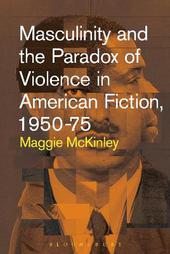
|
Masculinity and the Paradox of Violence in American Fiction, 1950-75
Hardback
Main Details
| Title |
Masculinity and the Paradox of Violence in American Fiction, 1950-75
|
| Authors and Contributors |
By (author) Maggie McKinley
|
| Physical Properties |
| Format:Hardback | | Pages:216 | | Dimensions(mm): Height 229,Width 152 |
|
| Category/Genre | Literary studies - from c 1900 -
Literary studies - fiction, novelists and prose writers |
|---|
| ISBN/Barcode |
9781628924817
|
| Classifications | Dewey:813.5093552 |
|---|
| Audience | | Postgraduate, Research & Scholarly | | Undergraduate | |
|---|
|
Publishing Details |
| Publisher |
Bloomsbury Publishing Plc
|
| Imprint |
Bloomsbury Academic USA
|
| Publication Date |
18 June 2015 |
| Publication Country |
United States
|
Description
Masculinity and the Paradox of Violence in American Fiction, 1950-75 explores the intersections of violence, masculinity, and racial and ethnic tension in America as it is depicted in the fiction of Ralph Ellison, Richard Wright, Norman Mailer, Saul Bellow, James Baldwin, and Philip Roth. Maggie McKinley reconsiders the longstanding association between masculinity and violence, locating a problematic paradox within works by these writers: as each author figures violence as central to the establishment of a liberated masculine identity, the use of this violence often reaffirms many constricting and emasculating cultural myths and power structures that the authors and their protagonists are seeking to overturn.
Author Biography
Maggie McKinley is Assistant Professor of English at Harper College, USA, where she teaches courses in American Literature.
ReviewsWith its detailed and careful analysis of the representations of masculinity and violence in [the selected novels], McKinley's book makes a significant contribution to masculinity studies. * Culture, Society & Masculinities * Maggie McKinley's focus on masculinity and violence through existentialism provides a useful new way of looking at marginalized American masculinities portrayed in twentieth-century Jewish-American and African-American novels. There are some sharp and nuanced readings here; she is particularly outstanding on Wright, Baldwin, and Roth, and offers a careful re-evaluation of Mailer's An American Dream. The book should appeal to readers interested in race and ethnicity in American literature, in comparative studies of African-American and Jewish-American fiction since WW II, in existentialism in modern literature, or in gender studies. * Andrew Gordon, Professor Emeritus of English, University of Florida, USA, and author of An American Dreamer: A Psychoanalytic Study of the Fiction of Norman Mailer * McKinley's study reconnoiters and then occupies the bloody, contested ground between the ramparts of masculine violence and feminist condemnation of it in this perspicacious examination of canonical novels by three black writers-Wright, Ellison and Baldwin-and three Jewish writers-Bellow, Mailer and Roth. Alert to every motivational nuance, she provides a new, valuable and balanced understanding of the contradictions of male brutality as depicted by these major writers. * J. Michael Lennon, Emeritus Professor of English, Wilkes University, USA, and author of Norman Mailer: A Double Life (2013) * This is a ground-breaking study that situates nuanced readings of some of the most important American fiction of the post-war period in the context of an existentialist interrogation of the relationship between masculinity and violence. McKinley writes with clarity and elegance, and her book will be invaluable to students and scholars of twentieth-century fiction and gender studies. * David Brauner, Professor of Contemporary Literature, The University of Reading, UK * Prof. McKinley breathes fresh new life into masculinity studies with this penetrating and detailed examination of violence and masculinity in six master American writers in the third quarter of the Twentieth Century. The period from 1950 to 1975 is diverse and prime for mining meanings of masculinity out of these literary giants in their respective expressions of American manhood. McKinley's theoretical template is fertile, derived from the work of seminal French Existentialism, particularly Sartre and De Beauvoir. What makes her analysis so powerful is that McKinley does not attempt to simply chronicle or explain motifs of masculinity. She moves one step further and interrogates them in the full force of Platonic inquiry. This study unsheathes moments of interpretations of masculinity and its underside-violence-in ways that are strikingly innovative, such as her exploration of the intertwining of aesthetics and violence within the complex tapestry of anxiety. The complications and struggles for gendered American identity are strikingly and compellingly articulated in this fine tome. * Phillip Sipiora, Professor of English and Film Studies, University of South Florida, USA, and editor of The Mailer Review *
|